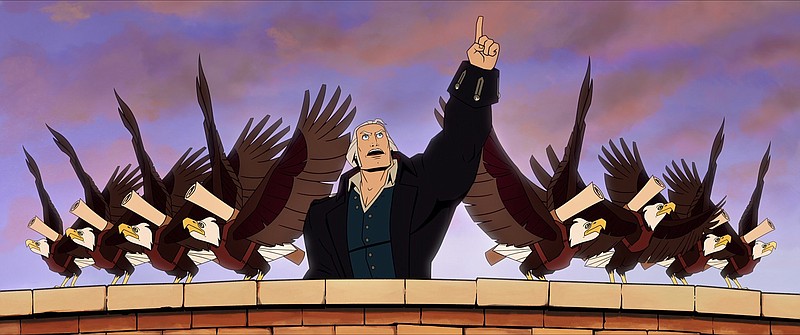As Fourth of July celebrations go, the new Netflix animated film "America: The Motion Picture" is the cinematic equivalent of a 3-foot-long hot dog followed by a triple-fried Twinkie washed down by a keg of barely chilled beer.
Sporadically clever but mostly just lazy, director Matt Thompson's gory and willfully anachronistic retelling of the American Revolution follows a George Washington (voice of Channing Tatum) so brawny he'd give a Reagan-era Arnold Schwarzenegger body-image concerns. Oh, and he's chasing after a werewolf Benedict Arnold (Andy Samberg) with the help of a ragtag group of misfit Founding Fathers and his own chain-saw hands (picture Wolverine, but with cherry tree destroyers).
The gulf between stupid-smart and just plain stupid feels immeasurably vast when watching "America: The Motion Picture," which is clearly aiming for the former but lands squarely in the latter. Thompson is an executive producer on FXX's James Bond parody "Archer," which in its bracing early years exemplified stupid-smart comedy with its then-novel setting (a palimpsest of the 1960s, 1980s and the 2010s) and its exuberantly inconsequential missions.
Making a doomed Abraham Lincoln (Will Forte) Washington's best bud, Thompson and writer Dave Callaham ("Zombieland: Double Tap") bring that middle finger to historical fidelity here, to piffling effect. Midway through the movie, Washington and his revolutionary crew scout a club called Vietnam where Arnold's superior, King James (Simon Pegg), is hiding. The Founding Fathers could storm the henchman-filled lair, but one of the heroes notes that the impetuous plan could end up a "quagmire." Ha-ha?
The one element that's not as obvious as the future Mrs. Washington's (Judy Greer) balloon breasts is how tongue-in-cheek the script's heavy reliance on formula is supposed to be. There are quite a few character-developing revelations (taking them from paper-thin to puddle-deep), but each step in the plot is about as preordained as videos of fireworks mishaps uploaded to YouTube on the morning of July 5.

After a lupine Benedict Arnold rips out Lincoln's throat at Ford's Theatre — Old Faithful should really be named after those compulsory geysers of blood — Washington vows to avenge his friend's death and fulfill his dying wish of founding a new country called America. (Why would Lincoln want this? Why would you expect this movie to answer that question?) Washington first enlists a fratty Samuel Adams (Jason Mantzoukas) in his fight against the redcoats, though the good old boy isn't sure whether the new country he wants to bring into existence should have to be hospitable to anyone other than rich white men. Joining the duo in short order are a weirdly horsey Paul Revere (Bobby Moynihan, delivering the stacked voice cast's only noteworthy performance); a science-championing Thomas Edison (Olivia Munn); and a reluctant but resigned Geronimo (Raoul Max Trujillo), who hopes that the new country will restore some of the colonists' land back to the original inhabitants.
I'm inclined to think that Thompson and Callaham set out to make their plot predictable, if only so the film's surprises pop that much more. But that gives us precious little reason to care about the story line because it's set in the 1770s (-ish) and because low-hanging fruit is this "America's" chief export. I did laugh at the repurposing of the term "racist" in this universe, which has more to do with horses than white supremacy, but the joke (repeated seemingly half a dozen times) also emphasizes how gracelessly the movie balances its desire to pay tribute to the Founding Fathers' democratic ideals with their extremely limited views on who should be able to pursue or exercise them.
For a very narrow slice of the nation's demographic, though, "America: The Motion Picture" could inspire a new tradition: Smash a beer can on one's forehead and argue with a friend about who is the more patriotic figure: Abraham Lincoln, Vampire Hunter, or George Washington, Chain-Saw Hands.

